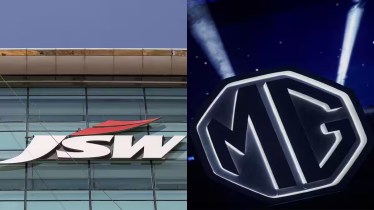JSW MG Motor India – the country’s newest carmaker that was formed last year after the coming together of China’s SAIC Motor and India’s JSW Group – doesn’t intend to launch all-new internal combustion engine cars, Parth Jindal, director, JSW MG Motor India, told FE. “We want to bank on new energy vehicles, or NEVs, such as battery electric vehicles, and strong and plug-in hybrids,” he said. “We are not keen on bringing in all-new ICE vehicles, diesel or petrol, and we want to do away with these.”
Jindal, however, added that it doesn’t mean JSW MG won’t launch even a single ICE vehicle in the future. “We might, but the focus is NEVs,” he said.
On Monday, JSW MG launched the Windsor EV, its third electric car. The carmaker now has a portfolio of three ICE cars (Astor, Hector, and Gloster), and three EVs (Comet EV, ZS EV, and Windsor EV).
Rajeev Chaba, CEO Emeritus, JSW MG Motor India, told FE that during January-July, the EV sales percentage in MG’s total sales was 35%, which will hopefully touch 50% by the end of this calendar year. “During January-July 2024, we had two EV models and three ICE models. These two EV models contributed 35% to our sales. Now with a third EV model – the Windsor EV – more than 50% of our sales will comes from EVs by the end of this calendar year,” he said.
On the global slowdown in EV sales, which has forced many carmakers such as Mercedes-Benz and Volvo abandoning their target to produce only fully electric cars by 2030, Chaba said that EV sales aren’t plateauing, but they are low compared to expectations. “Nobody is moving away from EVs – which are the future – but some carmakers are resetting their targets,” he said.
“JSW MG, however, is going strong. Our EV volumes grew by a whopping 52% in first seven months of this year, and we expect to do even better, now that we have third model.”
An automotive analyst said that thanks to the price cut in February 2024, JSW MG’s EV sales have shot up. “In February, the price of the Comet EV was reduced by up to Rs 1.4 lakh, and that of the ZS EV by up to Rs 3.9 lakh,” he said. “It pushed up volumes.”
According to data from JATO Dynamics India, overall EV sales in the country grew 10% during January-July – from 49,028 units in January-July 2023 to 54,118 units in January-July 2024.
“Today, only about 2.5% of Indian car-buyers choose an EV, but there are 5-6% tentative buyers who are on the fringe,” Chaba said. “With cars like the Windsor EV, our aim to convert those 5-6% into EV buyers, which in itself would be quite a good number to begin with.”
With the Windsor EV, the carmaker has launched a new pricing methodology. The car is priced Rs 9.99 lakh, which is the price of only the body shell, not the battery.
The battery costs Rs 3.5/km, so the more you drive, the more you pay, and the less you drive, the less you pay. This model is called Battery as a Service (BaaS), and it’s being introduced for the first time in India.
Jindal added that the Windsor EV comes with a lifetime battery warranty (to the first owner, and it won’t be applicable if you sell the car to another person), there is assured 60% buyback after 3 years or 45,000 km, and Windsor EV buyers will get 1-year free charging at public chargers through the eHUB by MG app, which covers around 8,500 public charging points of the total 12,000 in India.
Explaining it further, Jindal said that the Windsor EV costs almost the same as a Rs 10 lakh manual gearbox petrol/diesel SUV, but to drive that SUV, you need to spend at least Rs 8-10 km on fuel, plus servicing and maintenance costs. “Driving the Windsor EV will cost you just Rs 3.5/km, and Rs 1/km extra if you charge at home,” Jindal said. “Moreover, EVs barely have any maintenance costs.”
Analysts told FE that a battery costs almost 35-40% of an EV, and if the Windsor EV was introduced via traditional pricing mechanism, costs would have gone above Rs 15 lakh.
It’s a big car, and combines the comfort of a sedan and the spaciousness of an SUV. Its rear seats can be reclined by 135 degrees, its whole roof is made of glass, it’s got a largest-in-segment boot space of 604 litres (even more than Creta or Seltos), and a very long wheelbase of 2,700 mm. It’s got a 38-kWh battery, claimed driving range of 331 km, and can be charged in 40 minutes at any DC fast charger. Bookings will start on October 3.
